“Wiki-Gate”: How Julian Assange was Framed by His Supporters
We must understand the history: On how Assange was betrayed and misled by those who allegedly supported him.
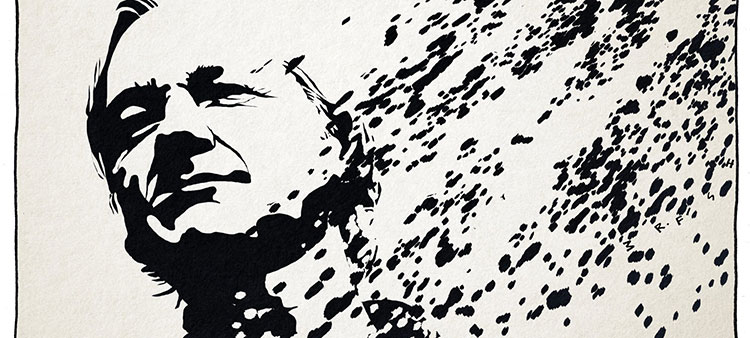
We must act decisively in support and in solidarity with Julian Assange. In this regard, we must understand the history: On how Assange was betrayed and misled by those who allegedly supported him.
In October 2021, the U.S. government began a legal challenge to extradite Julian Assange from the U.K. “to face charges of violating the Espionage Act”. The UK Supreme Court turned down Assange’s appeal to “prevent his extradition to the United States”.
On April 20, 2022, a UK magistrates court formally approved the extradition of Julian Assange to the US “on espionage charges”.
Two days ago, Assange’s final appeal hearing began in the UK’s High Court.
Julian Assange’s Relation with the Mainstream Media
Julian Assange was initially lauded and supported by the mainstream media.
In 2008 The Economist, which is partly owned by the Rothschild family granted Assange The New Media Award.
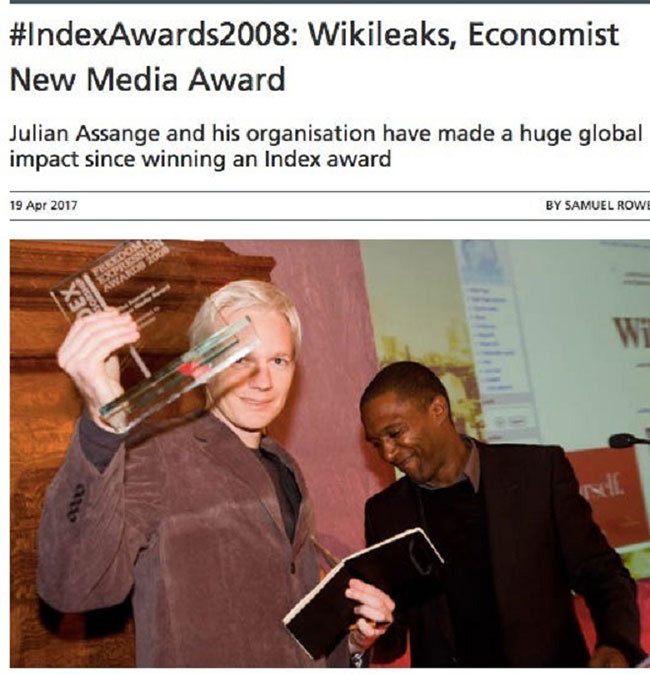
Was this a genuine endorsement of Assange’s commitment to “freedom of the press”? Or was it a public relations ploy?
Assange was framed by those who supported him: The Guardian, The New York Times, The Economist, Vaughan Smith, George Soros, the Rothschilds, the Council on Foreign Relations, et al.
Assange has been accused by the same corporate media which praised his achievements. In retrospect, it was a carefully planned operation. The Wiki “Leaks” were selectively “overseen”.
Here are details regarding some of the key players:
Henry Vaughan Lockhart Smith
Henry Vaughan Lockhart Smith, a former British Grenadier Guards captain came to his rescue. Assange was provided refuge at his house in Norfolk. They had a close friendship.
Vaughn Lockhart Smith was the founder of the London based Frontline Club (which is supported by George Soros’ Open Society Institute).
In 2010, the Frontline Club served as the de facto U.K “headquarters” for Julian Assange.
Vaughan Smith is not an “independent journalist”, he actively collaborated with NATO, as an embedded reporter and cameraman in several US-NATO war theaters including Iraq, Afghanistan, Bosnia, Chechnya, and Kosovo
In 1998 –prior to the onslaught of NATO’s war on Yugoslavia– he worked as a video journalist in Kosovo in a production entitled The Valley, which consisted in “documenting” alleged Serbian atrocities against Kosovar Albanians on behalf of US-NATO which invaded Yugoslavia on March 24, 1999.
The video production was carried out with the support of the Kosovo Liberation Army (KLA), whose leader Hashim Thaci became president of Kosovo. In 1998, Thaci was on the Interpol list. Twenty years later, Thaci was indicted by the Hague Tribunal for crimes against humanity including “murder, enforced disappearances, persecution and torture”.
David E. Sanger, New York Times
The New York Times was complicit: David E Sanger, Chief Washington correspondent of the NYT was involved in the redacting of Wikileaks in consultation with the US State Department [emphasis added]:
“[W]e went through [the cables] so carefully to try to redact material that we thought could be damaging to individuals or undercut ongoing operations. And we even took the very unusual step of showing the 100 cables or so that we were writing from to the U.S. government and asking them if they had additional redactions to suggest.”
PBS Interview; The Redacting and Selection of Wikileaks documents by the Corporate Media, PBS interview on “Fresh Air” with Terry Gross: December 8, 2010.
David E. Sanger is a member of the Council on Foreign Relations (CFR) and the Aspen Group. The NYT also has links with US intelligence.
It is worth noting that several American journalists, members of the Council on Foreign Relations had interviewed Wikileaks, including Time Magazine’s Richard Stengel (November 30, 2010) and The New Yorker’s Raffi Khatchadurian. (WikiLeaks and Julian Paul Assange : The New Yorker, June 11, 2007).
The Insidious Role of the U.S. State Department
The New York Times redaction of classified material was carried out in close consultation with the US State Department (See David Sanger’s statement above).
It’s a bombshell: The State Department was collaborating with the NYT in facilitating the release of classified documents. This in itself raises legal issues.
In a February 21, 2024 report:
“The United States’ bid to prosecute Julian Assange is “state retaliation”, the High Court has heard in his final bid to escape extradition.
The Wikileaks founder faces extradition to the US over an alleged conspiracy to obtain and disclose national defence information following the publication of hundreds of thousands of leaked documents relating to the Afghanistan and Iraq wars.
In a January 2021 ruling, then-district judge Vanessa Baraitser said that Assange should not be sent to the US, citing a real and “oppressive” risk of suicide, while ruling against him on all other issues.”
From a legal standpoint, it is not “State Retaliation”, quite the opposite, it’s “State Collusion”: The US State Department is on record: It provided a green light to the NYT for the release of redacted classified documents.
And now the US government is intent on extraditing Julian Assange from the UK “to face charges of violating the Espionage Act”.
Is there not a conflict of interest somewhere?
From a legal standpoint, is the U.S. State Department in violation of the Espionage Act?
The Open Letter by the NYT, Guardian, Der Spiegel, Le Monde, El Pais
The five major news media which were instrumental in the release and “redacting” of the WikiLeaks documents issued in 2019 a somewhat contradictory joint statement (Open letter) requesting the release of Julian Assange.
They accuse Assange for releasing classified documents on corruption and US government fraud, while acknowledging their role in releasing redacted texts of classified documents. Are they not also in violation of the Espionage Act.
Below is the text of the letter.
An open letter from editors and publishers: Publishing is not a Crime
Twelve years ago, on 28 November 2010, our five international media outlets – The New York Times, the Guardian, Le Monde, El País and DER SPIEGEL – published a series of revelations in cooperation with Wikileaks that made the headlines around the globe.
“Cable gate”, a set of 251,000 confidential cables from the US State Department disclosed corruption, diplomatic scandals and spy affairs on an international scale.
In the words of The New York Times, the documents told “the unvarnished story of how the government makes its biggest decisions, the decisions that cost the country most heavily in lives and money”. Even now in 2022, journalists and historians continue to publish new revelations, using the unique trove of documents.
For Julian Assange, publisher of Wikileaks, the publication of “Cable gate” and several other related leaks had the most severe consequences. On 11 April 2019, Assange was arrested in London on a US arrest warrant, and has now been held for three and a half years in a high security British prison usually used for terrorists and members of organised crime groups. He faces extradition to the US and a sentence of up to 175 years in an American maximum security prison.
This group of editors and publishers, all of whom had worked with Assange, felt the need to publicly criticise his conduct in 2011 when unredacted copies of the cables were released, and some of us are concerned about the allegations in the indictment that he attempted to aid in computer intrusion of a classified database. But we come together now to express our grave concerns about the continued prosecution of Julian Assange for obtaining and publishing classified materials.
The Obama-Biden Administration, in office during the Wikileaks publication in 2010, refrained from indicting Assange, explaining that they would have had to indict journalists from major news outlets too. Their position placed a premium on press freedom, despite its uncomfortable consequences. Under Donald Trump however, the position changed. The DOJ relied on an old law, the Espionage Act of 1917 (designed to prosecute potential spies during World War 1), which has never been used to prosecute a publisher or broadcaster.
This indictment sets a dangerous precedent, and threatens to undermine America’s First Amendment and the freedom of the press.
Holding governments accountable is part of the core mission of a free press in a democracy.
Obtaining and disclosing sensitive information when necessary in the public interest is a core part of the daily work of journalists. If that work is criminalised, our public discourse and our democracies are made significantly weaker.
Twelve years after the publication of “Cable gate”, it is time for the U.S. government to end its prosecution of Julian Assange for publishing secrets.
Publishing is not a crime.
The editors and publishers of:
The Guardian, The New York Times, Le Monde, DER SPIEGEL, El País
Who are the criminals?
Those who leak secret government documents which provide irrefutable evidence of extensive crimes against humanity or the politicians in high office who order the killings and atrocities?
What is unfolding is not only “the criminalization of the State”, the judicial system is also criminalized with a view to upholding the legitimacy of the war criminals in high office.
And the corporate media through omission, half truths and outright lies upholds war as a peace-making endeavor.
When the lie becomes the truth there is no moving backwards. We stand in solidarity with Julian Assange.
Originally published via Global Research, December 3, 2022, updated February 21, 2024.
Below is the text of my article first published in April 2019:
Wiki-Gate: Julian Assange Was Framed by the People Who Supported Him
Julian Assange’s arrest (after almost seven years in the Ecuadorian Embassy) constitutes a hideous and illegal act. He is imprisoned in Britain’s Belmarsh maximum security prison, pending his extradition to the United States.
Statements by US prosecutors suggest that Assange would not be charged under the 1917 Espionage Act. What is contemplated are accusations of conspiring “to commit unlawful computer intrusion based on his alleged agreement to try to help Ms. Manning break an encoded portion of passcode that would have permitted her to log on to a classified military network under another user’s identity.” (NYT, April 11, 2019).
The charges can of course be changed and shifted around. Bolton-Pompeo will no doubt play a role. In a 2017 statement when he was CIA Director Mike Pompeo “referred to WikiLeaks as a “non-state hostile intelligence service,” which needed to be eradicated.”
Assange is relentlessly accused by the corporate media of treason, acting on behalf of the Kremlin. An indictment invoking the 1917 Espionage Act remains a distinct possibility with a view to overriding The First Amendment of the US Constitution which guarantees Freedom of Expression.
Assange constitutes a new Russia-Gate media narrative? His arrest coincides with the release of the redacted version of the Mueller report.
Prepare for Wiki-Gate: a long and drawn-out legal procedure which will be the object of extensive media coverage with a view to ultimately misleading the public.
The unspoken objective of Assange’s indictment is to create a legal precedent which will enable Washington and its allies to arrest independent and anti-war journalists indiscriminately.
What is at stake, –revealed by Wikileaks– is that politicians in high office are the architects of war crimes. To protect them and sustain their legitimacy, they require the suppression of freedom of expression, which in turn requires “the criminalization of justice”.
Ironically, from the very outset (over a period of more than 12 years) there has never been a concerted effort on the part of Washington (and its national security intelligence apparatus) to suppress the release of classified US government information or to close down the Wikileaks project. In fact, quite the opposite.
Why?
Because the carefully selected and redacted Wikileaks quotes by the mainstream media have been used to provide legitimacy to US “foreign policy” as well as obfuscate (through omission) many of the crimes committed by US intelligence and the Pentagon.
Wikileaks and the Mainstream Media
It is important to note that Julian Assange from the outset was supported by the mainstream media, which was involved in releasing selected and redacted versions of the leaks. And despite Assange’s arrest and imprisonment, Wikileaks continues to release compromising US diplomatic cables, the latest of which (reported by McClatchy, April 17, 2019) pertains to “evidence that US troops executed at least 10 Iraqi civilians” including a 5 month old infant.
At the outset of the Wikileaks project, the mainstream media including the New York Times, The Guardian and the Economist praised Julian Assange. The British elites supported him. Assange became a personality. It was a vast Public Relations campaign. It was a money-making undertaking for the corporate media.
In 2008 The Economist (which is partly owned by the Rothschild family) granted Assange The New Media Award.
About-turn? Shift in the Mainstream Media Narrative
Today, ironically these same corporate media which praised Assange are now accusing him (without a shred of evidence) of being involved in acts of conspiracy on behalf of the Kremlin. According to John Pilger:
“The Guardian has since published a series of falsehoods about Assange, not least a discredited claim that a group of Russians and Trump’s man, Paul Manafort, had visited Assange in the [Ecuadorian] embassy. The meetings never happened; it was fake.”
Assange has been the object of an all out smear campaign by those who supported him.
According to Pilger:
“A plan to destroy both WikiLeaks and Assange was laid out in a top secret document dated 8 March, 2008 [by] the Cyber Counter-intelligence Assessments Branch of the US Defence Department… Their main weapon would be personal smear. Their shock troops would be enlisted in the media.” The Economist which granted Assange the New Media Award in 2008 now intimates that he is an enemy agent responsible for “information anarchy … culminating in the destabilization of American democracy”.

Others think it a long-overdue reckoning with justice for a man who had unleashed information anarchy upon the West, culminating in the destabilisation of American democracy. Is Mr Assange a heroic journalist, reckless activist or even an enemy agent? (The Economist, April 12,2019, emphasis added)
The smear operation is ongoing:

Starting in early 2017, coinciding with RussiaGate, Assange is depicted as a “Putin Stooge” working for the Kremlin, Why?
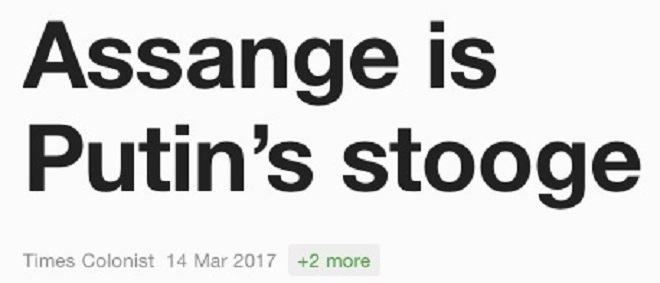
In 2016, some of Mr. Assange’s former American sympathizers turned sharply against him after he made WikiLeaks into an enthusiastic instrument of Russia’s intervention in the American presidential election, doling out hacked Democratic emails to maximize their political effect, campaigning against Hillary Clinton on Twitter and promoting a false cover story about the source of the leaks. (NYT, April 2019, emphasis added)
And then The Guardian, (April 20) with which Assange actively collaborated goes into a high-gear smear operation and character assassination: “cheap journalism” by the Guardian (read excerpt below):
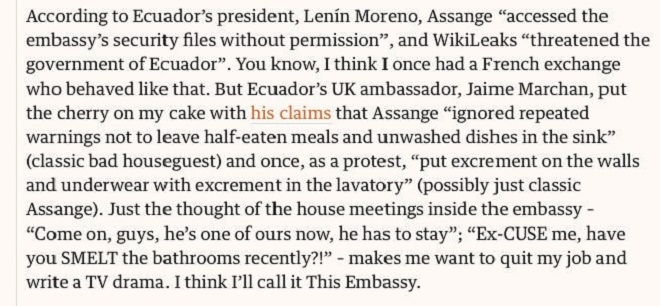
Was Julian Assange Framed by the People Who Supported Him?
The latest from the New York Times April 15, 2019, which previously collaborated with Assange, describes him as a threat to National Security, working on behalf of the Russians.
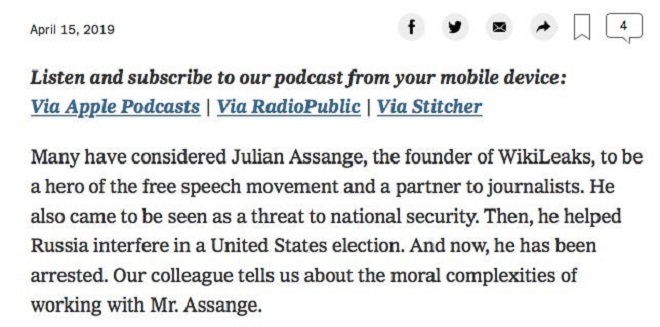
Flashback to 2010:WikiLeaks published a series of controversial intelligence leaks including some 400,000 classified Iraq war documents, covering events from 2004 to 2009 (See Tom Burghardt, The WikiLeaks Release: U.S. Complicity and Cover-Up of Iraq Torture Exposed, Global Research, October 24, 2010).
These revelations contained in the Wikileaks Iraq War Logs provided “further evidence of the Pentagon’s role in the systematic torture of Iraqi citizens by the U.S.-installed post-Saddam regime.” (Ibid).
The Role of the Frontline Club. Assange’s Social Entourage
While Assange was committed (through the release of leaked government documents) to revealing the “unspoken truth” of corruption and war crimes, many of the people (and journalists) who “supported him” are largely “Establishment”: Upon his release from bail in December 2010 (Swedish extradition order over allegations of sexual offenses) Henry Vaughan Lockhart Smith, a friend of Assange, a former British Grenadier Guards captain and a member of the British aristocracy came to his rescue. Assange was provided refuge at Vaughan Smith’s Ellingham Manor in Norfolk.
Vaughn Lockhart Smith is the founder of the London based Frontline Club (which is supported by George Soros’ Open Society Institute). In 2010, the Frontline Club served as the de facto U.K “headquarters” for Julian Assange.
Vaughan Smith is a journalist aligned with the mainstream media. He had collaborated with NATO, acted as an embedded reporter and cameraman in various US-NATO war theaters including Afghanistan and Kosovo. In 1998 he worked as a video journalist in Kosovo in a production entitled The Valley, which consisted in “documenting” alleged Serbian atrocities against Kosovar Albanians. The video production was carried out with the support of the Kosovo Liberation Army (KLA).
Upon Assange’s arrest on April 10, 2019 Vaughn Smith, while acknowledging his disagreements with Assange, nonetheless expressed his unbending support and concern for Assange:
Smith said that while he didn’t agree that everything Assange released should have been released, he did think the Wikileaks founder “triggered a discussion about transparency that is incredibly important.”
“I support Julian because I think his rights as an individual reflect on us, his fellow citizens,” he told Tremonti.
“I think how we treat somebody who we may not agree with, that tells us truths that we may not wish to know … is a great comment on us.” (CBC, April 10, 2019)
The Role of the Corporate Media: The Central Role of the New York Times
The New York Times, the Guardian, Der Spiegel and El Pais (Spain) were directly involved in the editing, redacting and selection of leaked documents.
In the case of the New York Times, coordinated by Washington Bureau Chief David Sanger, the redacted versions were undertaken in consultation with the US State Department.
Even before the Wikileaks project got off the ground, the mainstream media was implicated. A role was defined and agreed upon for the corporate media not only in the release, but also in the selection and editing of the leaks. The “professional media”, to use Julian Assange’s words in an interview with The Economist, had been collaborating with the Wikileaks project from the outset.
Moreover, key journalists with links to the US foreign policy-national security intelligence establishment have worked closely with Wikileaks, in the distribution and dissemination of the leaked documents.
In a bitter irony, The New York Times, which has consistently promoted media disinformation was accused in 2010 of conspiracy. For what? For revealing the truth? Or for manipulating the truth? In the words of Senator Joseph L. Lieberman:
I certainly believe that WikiLleaks has violated the Espionage Act, but then what about the news organizations — including The Times — that accepted it and distributed it?” Mr. Lieberman said, adding: “To me, The New York Times has committed at least an act of bad citizenship, and whether they have committed a crime, I think that bears a very intensive inquiry by the Justice Department.” (WikiLeaks Prosecution Studied by Justice Department – NYTimes.com, December 7, 2010)
This “redacting” role of The New York Times was candidly acknowledged by David E Sanger, Chief Washington correspondent of the NYT:
“[W]e went through [the cables] so carefully to try to redact material that we thought could be damaging to individuals or undercut ongoing operations. And we even took the very unusual step of showing the 100 cables or so that we were writing from to the U.S. government and asking them if they had additional redactions to suggest.” (See PBS Interview; The Redacting and Selection of Wikileaks documents by the Corporate Media, PBS interview on “Fresh Air” with Terry Gross: December 8, 2010, emphasis added).
Yet Sanger also said later in the interview:
“It is the responsibility of American journalism, back to the founding of this country, to get out and try to grapple with the hardest issues of the day and to do it independently of the government.” (ibid, emphasis added)
“Do it independently of the government” while at the same time “asking them [the US government] if they had additional redactions to suggest”?
David E. Sanger is not a model independent journalist. He is member of the Council on Foreign Relations (CFR) and the Aspen Institute’s Strategy Group which regroups the likes of Madeleine K. Albright, Condoleeza Rice, former Defense Secretary William Perry, former CIA head John Deutch, among other prominent establishment figures.
It is worth noting that several American journalists, members of the Council on Foreign Relations had interviewed Wikileaks, including Time Magazine’s Richard Stengel (November 30, 2010) and The New Yorker’s Raffi Khatchadurian. (WikiLeaks and Julian Paul Assange : The New Yorker, June 11, 2007)
Historically, The New York Times has served the interests of the Rockefeller family in the context of a longstanding relationship. In turn, the Rockefellers have an important stake as shareholders of several US corporate media.
Concluding Remarks
Who are the criminals?
Those who leak secret government documents which provide irrefutable evidence of extensive crimes against humanity or the politicians in high office who order the killings and atrocities.
What is unfolding is not only “the criminalization of the State”, the judicial system is also criminalized with a view to upholding the legitimacy of the war criminals in high office.
And the corporate media through omission, half truths and outright lies upholds war as a peace-making endeavor.





















